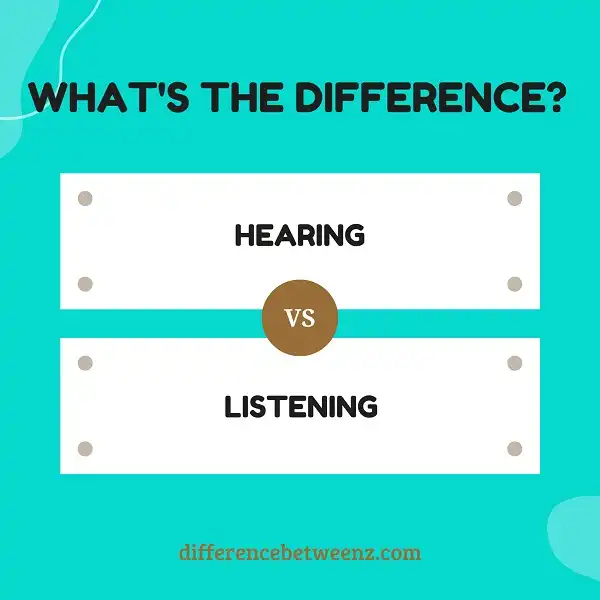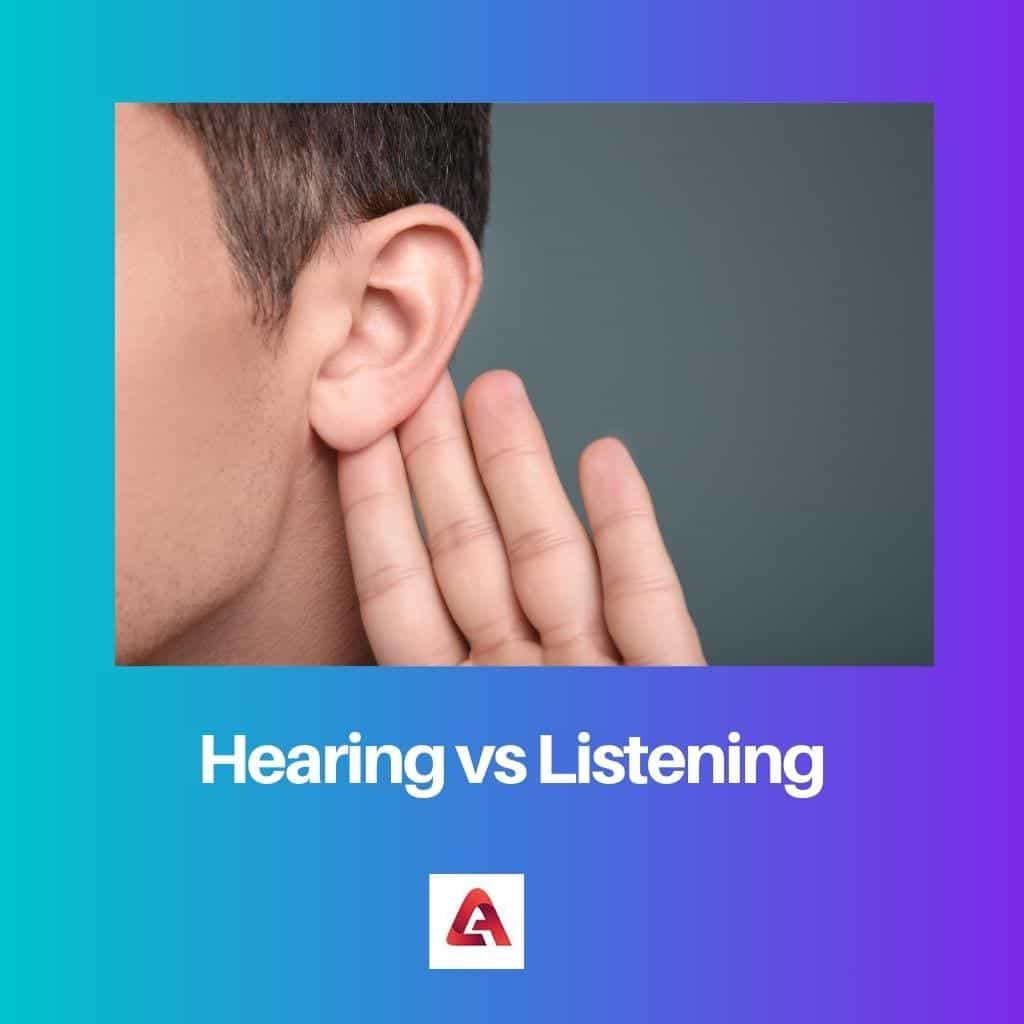Communication is a fundamental aspect of human interaction, and understanding the difference between hearing and listening is crucial for effective communication. While hearing is a passive process, listening involves active engagement and interpretation of sound. This distinction plays a vital role in shaping how we interact and connect with others.
In today's fast-paced world, communication often gets overlooked, and many people confuse hearing with listening. This misunderstanding can lead to misinterpretations and breakdowns in communication. Understanding the nuances of hearing and listening can significantly enhance interpersonal relationships and improve overall communication skills.
This article will explore the difference between hearing and listening in communication, delve into their psychological and physiological aspects, and provide actionable tips to become a better listener. By the end, you'll have a deeper understanding of how to communicate effectively and build stronger connections with others.
Read also:Exploring The Life Of Damon Wayans Wife A Closer Look
Table of Contents
- Biological Difference Between Hearing and Listening
- Psychological Aspects of Hearing and Listening
- The Importance of Listening in Communication
- Common Misconceptions About Hearing and Listening
- Tips for Effective Listening
- Barriers to Effective Listening
- The Impact of Technology on Listening Skills
- Cultural Differences in Listening Practices
- Listening Skills in Professional Settings
- Conclusion and Call to Action
Biological Difference Between Hearing and Listening
Hearing is a physiological process that occurs when sound waves travel through the ear and are processed by the brain. It is an involuntary action that happens automatically, even when we are not consciously paying attention. On the other hand, listening is a cognitive process that requires focus, attention, and interpretation of the sounds we hear.
Research shows that the human brain can process approximately 400 words per minute, but people typically speak at a rate of 125-150 words per minute. This discrepancy creates opportunities for the mind to wander, making it challenging to maintain focus during conversations.
How the Brain Processes Sound
When sound waves enter the ear, they are converted into electrical signals that travel to the auditory cortex in the brain. The auditory cortex then interprets these signals, allowing us to recognize and understand the sounds we hear. However, listening goes beyond mere sound recognition; it involves comprehending the meaning behind the words and interpreting non-verbal cues such as tone, pitch, and body language.
Psychological Aspects of Hearing and Listening
Listening is not just a physiological process but also a psychological one. It involves emotional engagement, empathy, and understanding. Effective listening requires the listener to be fully present and attentive, which can be challenging in today's distracted world.
Emotional Intelligence and Listening
Emotional intelligence plays a crucial role in listening. It enables listeners to empathize with speakers, understand their emotions, and respond appropriately. Studies show that individuals with higher emotional intelligence tend to be better listeners and communicators.
The Importance of Listening in Communication
Listening is a critical component of effective communication. It helps build trust, fosters understanding, and strengthens relationships. When people feel heard and understood, they are more likely to open up and share their thoughts and feelings.
Read also:Master The Art Of Ironon Vinyl Comprehensive Hello Hobby Ironon Vinyl Instructions
Effective listening also improves problem-solving and decision-making skills. By actively listening to others, we gain valuable insights and perspectives that can inform our actions and decisions.
Benefits of Active Listening
- Enhances understanding and clarity
- Builds stronger relationships
- Improves conflict resolution
- Increases productivity and efficiency
Common Misconceptions About Hearing and Listening
Many people believe that hearing and listening are the same things. However, this misconception can lead to communication breakdowns and misunderstandings. Here are some common myths about hearing and listening:
- Hearing is the same as listening
- Listening requires no effort
- Good listeners are born, not made
Dispelling these myths is essential for improving communication skills and becoming a better listener.
Tips for Effective Listening
Developing effective listening skills requires practice and dedication. Here are some tips to help you become a better listener:
Practice Active Listening
- Maintain eye contact with the speaker
- Avoid interrupting or finishing the speaker's sentences
- Ask clarifying questions to ensure understanding
Minimize Distractions
Eliminate distractions such as phones, computers, or background noise to focus fully on the conversation. This shows the speaker that you value their thoughts and are committed to understanding them.
Barriers to Effective Listening
Several factors can hinder effective listening, including:
- Environmental distractions
- Emotional barriers such as stress or anxiety
- Cognitive overload or information overload
Identifying and addressing these barriers is essential for improving listening skills and enhancing communication.
The Impact of Technology on Listening Skills
Technology has transformed the way we communicate, but it has also affected our listening skills. The rise of social media, texting, and instant messaging has made communication more convenient but less personal. Many people find it challenging to engage in deep, meaningful conversations due to the constant distractions of technology.
However, technology can also enhance listening skills when used effectively. For example, online courses and webinars can provide opportunities for people to learn and practice active listening in a virtual environment.
Cultural Differences in Listening Practices
Cultural differences can significantly impact listening practices. In some cultures, listening is considered a sign of respect and humility, while in others, it may be seen as a weakness. Understanding these cultural differences is essential for effective cross-cultural communication.
Cultural Listening Habits
- Asian cultures often emphasize listening as a way of showing respect
- Western cultures may prioritize speaking over listening
Listening Skills in Professional Settings
In professional settings, listening skills are crucial for success. Effective listening helps build rapport with clients, resolve conflicts, and improve teamwork. Employers value employees who can listen actively and communicate effectively.
Research from the American Management Association shows that employees with strong listening skills are more likely to receive promotions and career advancements.
Conclusion and Call to Action
Understanding the difference between hearing and listening in communication is essential for building strong relationships and improving overall communication skills. By practicing active listening, minimizing distractions, and addressing barriers to effective listening, you can become a better listener and communicator.
We invite you to share your thoughts and experiences in the comments section below. How has improving your listening skills impacted your personal and professional life? Don't forget to explore other articles on our site for more tips and insights on effective communication.
Data Source: American Management Association, Harvard Business Review, and National Institutes of Health.


